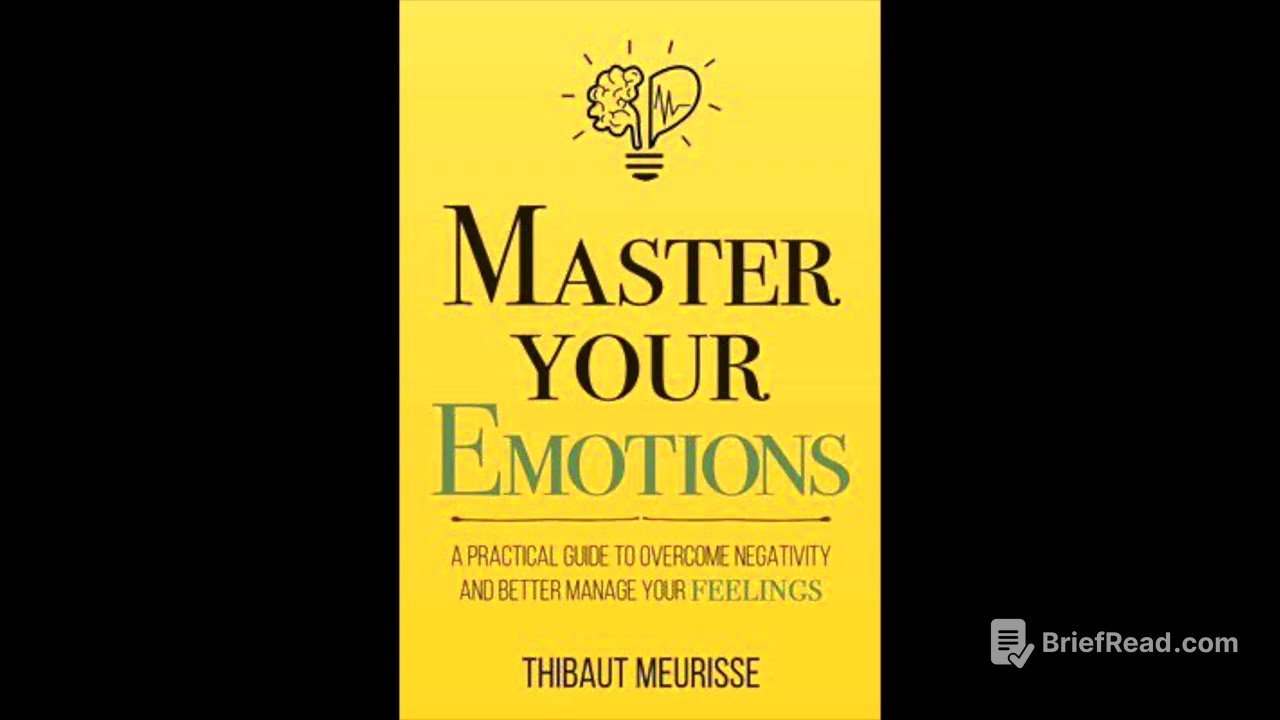TLDR;
This video summarizes the book "Master Your Emotions: A Practical Guide to Overcome Negativity and Better Manage Your Feelings" by Tebo Maurice. The book provides a guide to understanding and controlling emotions, dealing with negativity, and using emotions for personal growth. It emphasizes the importance of self-awareness, managing the ego, and understanding the impact of thoughts, body, and environment on emotional states.
- Understanding and controlling emotions
- Dealing with negativity
- Using emotions for personal growth
Introduction [0:08]
The author shares his personal experience of writing the book, admitting to experiencing both excitement and challenges. He emphasizes that everyone experiences a range of emotions, both highs and lows, and the key is to learn how to use these emotions for personal growth rather than being defeated by them. The author encourages the reader to be aware of their current feelings as the first step toward taking control of their emotions.
What You'll Learn in This Book [3:53]
The book serves as a how-to manual for understanding and managing emotions, covering topics such as identifying negative emotions, changing personal narratives, and reprogramming the mind for positive emotions. It is divided into four parts: understanding emotions, factors impacting emotions, how emotions are formed, and using emotions for personal growth. The book aims to provide readers with the tools to overcome fears and limitations and become the person they want to be.
How to Use This Book [5:58]
The author suggests reading the book in its entirety at least once, then revisiting specific sections for a deeper understanding. The book includes exercises, and readers are encouraged to select and apply those that resonate with them. The author also provides a link to a free step-by-step workbook designed to help master emotions.
How Your Survival Mechanism Affects Your Emotions [7:22]
The chapter explains how the brain is wired for survival, leading to a negativity bias. This bias, which was crucial for ancestors facing constant threats, still affects modern humans, causing them to overemphasize negative events like rejection. The author stresses the importance of distinguishing between real and imaginary threats and reprogramming the mind to interpret events in a more empowering way.
Why Your Brain's Job Isn't to Make You Happy [10:43]
The brain's primary function is survival, not happiness. Dopamine, a neurotransmitter, plays a significant role in reward-driven behaviors, which can be artificially triggered by social media, pornography, and gambling, leading to addiction. The author highlights the concept of hedonic adaptation, where people quickly adjust to new situations, meaning external achievements don't guarantee long-term happiness. Happiness is influenced more by genetics and internal factors than external events.
What is the Ego [16:42]
The ego is defined as the self-identity constructed throughout life, created through thoughts and interpretations of events. The author notes that the ego is neither good nor bad but a result of a lack of self-awareness. The ego needs an identity to exist, which it strengthens through identification with physical items, the body, relationships, and beliefs. The ego's main characteristics include equating having with being, living through comparison, never being satisfied, and needing the approval of others.
The Nature of Emotions [27:49]
Emotions are transient and should be accepted without strong identification. Negative emotions are not inherently bad and can serve a purpose, acting as a wake-up call or helping one learn something positive. The author emphasizes that negative emotions act as a filter, tainting experiences, and that the internal dialogue significantly impacts emotional states. Emotions act like magnets, attracting similar thoughts, and it's essential to break this cycle by compartmentalizing issues.
The Impact of Sleep on Your Mood [50:42]
The quality and quantity of sleep significantly affect emotional states. Sleep deprivation can lead to grumpiness, difficulty concentrating, and trouble dealing with negative emotions. The author provides tips for improving sleep quality, such as ensuring the bedroom is dark, avoiding electronic devices, relaxing the mind, avoiding excessive water intake before bed, and establishing an evening ritual.
Using Your Body to Influence Your Emotions [55:16]
Body language and posture can alter how one feels. Adopting high-power poses can increase testosterone and decrease cortisol levels, leading to increased confidence. Conversely, slouching and repeating negative phrases can create depression. Regular exercise improves both physical well-being and mood, treating mild to moderate depression as effectively as antidepressants.
Using Your Thoughts to Influence Your Emotions [1:00:38]
Thoughts define who you are and create your reality. Meditation helps tame the "monkey mind" and reduce the power and impact of thoughts, leading to less negative emotions. Visualization can trick the mind by simulating desired experiences, conditioning it to experience more positive emotions.
Using Your Words to Influence Your Emotions [1:02:17]
Words have a significant impact on thoughts and behaviors. Using confident language can boost confidence, while positive affirmations repeated regularly can condition the mind to experience positive emotions. The author also suggests engaging the body while performing affirmations to enhance their effect.
How Your Breathing Affects Your Emotions [1:05:27]
Proper breathing is essential for energy levels and emotional well-being. Slow breathing can reduce anxiety and increase awareness, while rapid breathing can release stress and boost energy.
How Your Environment Affects Your Emotions [1:06:45]
The environment, including people, TV shows, and living spaces, influences emotions. Decluttering and reorganizing can boost motivation.
How Music Affects Your Emotions [1:07:24]
Music affects mood, helping to relax, motivate, and access positive emotions. Listening to positive music can boost mood and self-esteem. Creating playlists tailored to emotional needs can condition the mind.
How Emotions Are Formed [1:12:47]
Emotions are formed through a process of interpretation, identification, and repetition. Negative emotions can be spontaneous or created in the mind by identifying with thoughts. The formula for emotion formation is: Interpretation + Identification + Repetition = Strong Emotion.
Changing Your Interpretation [1:21:36]
Emotions are generated by the way you choose to interpret events or thoughts. The author suggests exploring underlying assumptions and analyzing interpretations to experience more positive emotions.
Letting Go of Your Emotions [1:27:29]
Emotions are not facts and can be let go. Repressing emotions allows them to sink deeper into the subconscious, becoming part of one's identity. The author introduces a five-step process to let go of emotions: observe with detachment, label the emotion, let go, and use techniques from "The Sedona Method" (release, allow, welcome).
Conditioning Your Mind to Experience More Positive Emotions [1:36:03]
You become what you think about most of the time. Thoughts activate certain emotions, and these emotions generate more thoughts. The author suggests choosing the emotions you want to experience, putting a specific program in place, and practicing feeling that emotion every day.
Changing Your Emotions by Changing Your Behavior [1:50:48]
Changing behavior can influence emotions. The author suggests identifying the cause of negative emotions and taking concrete actions to change the emotional state.
Changing Your Emotions by Changing Your Environment [1:54:52]
To reduce negative emotions, avoid putting yourself in situations that generate them. The author provides examples of activities or behaviors that may rob you of your happiness, such as watching TV, spending time on social media, and hanging out with negative people.
Short-Term and Long-Term Solutions to Deal with Negative Emotions [1:58:32]
The author provides a list of exercises and techniques to better deal with negative emotions, including both short-term and long-term solutions. Short-term solutions include changing your emotional state, taking action, becoming aware of your emotions, and just relaxing. Long-term solutions include analyzing negative emotions, moving away from negativity, conditioning your mind, increasing your energy, and asking for help.
How Emotions Can Guide You in the Right Direction [2:08:28]
Emotions can foster personal growth by reminding you of what you already know and that you need to make changes in your life. The author emphasizes the importance of self-awareness and introduces models like "Above or Below the Line" and "Fear vs. Love" to help increase self-awareness.
Not Being Good Enough [2:18:12]
The author discusses the feeling of not being good enough and provides strategies to address it. These include identifying triggers, keeping track of accomplishments, learning to accept compliments, and using resources to improve self-esteem.
Being Defensive [2:32:51]
The need to defend yourself stems from the desire to protect your story or your ego. The author identifies three main reasons why you are triggered: there is part of truth in what you were told, you believe there is part of truth in what you were told, and one of your core beliefs has been attacked.
Stress and Worry [2:36:57]
Stress doesn't exist outside of yourself, and no situation can be said to be stressful in itself. The author provides strategies to reduce stress, such as reframing stressful situations and taking responsibility for your stress. Worry differs from stress as it is a concern you have regarding events from the past or events that may happen in the future.
Caring What People Think of You [2:44:47]
The author explains why you care so much what people think of you and what you can do to alleviate the situation. He emphasizes that you are the most important person in the world and that not everybody will love you.
Resentment [2:52:19]
When you resent people, you're angry at them because they didn't behave the way you wanted them to. The author provides strategies to deal with resentment, such as changing/reevaluating your interpretation, confronting the situation, forgiving, breaking free from identification, and forgetting/stopping repetition.
Jealousy [2:57:23]
When you experience jealousy, you desire something someone else has but you don't currently have. The author provides strategies to deal with jealousy, such as identifying who you are jealous of, recognizing that jealousy can signal a scarcity mindset, and remembering that jealousy may tell you to solve self-esteem issues.
Depression [3:10:41]
Non-clinical depression occurs when you're not where you want to be in life, you have lost any hope to ever be, and can't accept it. The author provides strategies to deal with depression, such as exercising, meditating, and focusing on others.
Fear Discomfort [3:19:25]
Whenever we try something new, we experience anxiety. The author provides strategies to deal with fear, such as taking action and realizing that fear is not going to go away.
Procrastination [3:24:22]
Procrastination is largely an emotional issue. The author provides a 16-step process to overcome procrastination, including understanding what's hidden behind procrastination, reminding yourself of the cost of procrastination, uncovering your story, rewriting your story, clarifying your why, identifying the ways you distract yourself, staying with the urge, recording everything you do, setting a clear intent behind everything you do, preparing your environment, starting small, creating quick wins, just getting started, creating daily habits to support you, using visualization, and building accountability.
Lack of Motivation [3:38:48]
Lacking motivation is usually a sign that you don't have a compelling vision to pursue. The author provides strategies to deal with a lack of motivation, such as knowing your strengths, knowing your personality, and knowing what motivates you.
Conclusion [3:47:00]
The author summarizes the key points of the book, emphasizing that the quality of your emotions determines the quality of your life. He encourages readers to use their emotions to grow and remember that they are beyond emotions.









